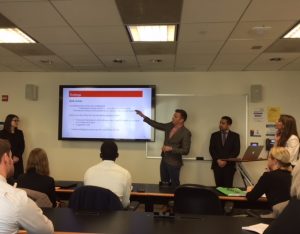 Why does Switzerland, surrounded by countries targeted for Islamic State attacks, remain untouched? Is a rigorous security policy keeping Europe’s “neutral” country safe? The answer, according to a team of Elliott School graduate students, is a firm “no.” In fact, research gleaned by the students for their master’s degree capstone project indicates that Switzerland urgently needs to address its security weaknesses.
Why does Switzerland, surrounded by countries targeted for Islamic State attacks, remain untouched? Is a rigorous security policy keeping Europe’s “neutral” country safe? The answer, according to a team of Elliott School graduate students, is a firm “no.” In fact, research gleaned by the students for their master’s degree capstone project indicates that Switzerland urgently needs to address its security weaknesses.
“Switzerland does not have a robust anti-terrorist policy, and they don’t have a codified anti- terrorist law,” said Marzia Faraz, MA ’18. During her team’s presentation, “An Assessment of ISIS and Switzerland and Swiss Security Policy,” Faraz emphasized that while the landlocked country has not yet experienced an attack, it is vulnerable.
Faraz and teammates Michael Reilly, Moe Velazco, Nate Wallace and Miranda Wickham were among more than 200 Elliott graduate students who, over the course of two hours on April 27, commandeered attention in classrooms in the Elliott School and the School of Business. The event was the culmination of their year-long research projects focused on security policy, global communications, Asian studies, and international affairs in general.
Presentations ran the gamut from transnational security to global gender issues to energy policy. One team, for example, analyzed Russian disinformation after the 2015 terrorist attacks in Paris. Several others focused on energy policy in various nations — Africa, Brazil, Japan,and the United States.
The Global Capstone Program is the signature project for Elliott graduate students from the International Affairs, Security Policy Studies, Global Communication and Asian Studies programs. Among schools of international affairs, capstones, which require on-the-ground research, are an increasingly popular alternative to theses, said Jodi Vittori, Adjunct Professor of International Affairs, who served as advisor to five teams.
“Schools are moving away from graduate theses, which are considered less practical than intense study and team presentations,” Vittori said.

